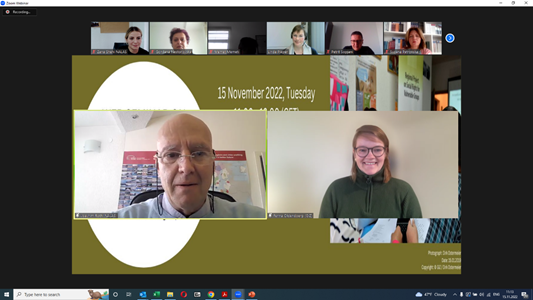
The web-seminar on Diversity Management (DM) is integral part of the project titled “Scaling up of minorities inclusion models and strengthening of service delivery in municipal structures in the Western Balkans” building upon the experiences relating to the previous project “Promotion and scaling up of models for inclusion of minorities and other vulnerable groups in the Western Balkans” which was implemented in 2021. Both projects aim to enhance capacities of local stakeholders with regard to the inclusion of minorities and other disadvantaged groups based on the Leave-No-One-Behind principle and successful social approaches applied in the federal state of Schleswig-Holstein.
As implementing partners, the State Chancellery of the Federal State of Schleswig-Holstein was represented by Ms. Linda Pieper from the Department of National Minorities, Ms. Fenna Oldendoerp (GIZ-Hamburg), Mr. Petrit Sopjani (GIZ-Kosovo) and NALAS Secretariat (Joachim Roth).
The online event brought together over 60 local government representatives, experts and practitioners, who explored the benefits that inclusion of vulnerable groups and diversity as a management tool and concept bring to the community. Information, experience and expertise about the contribution of DM was shared regarding benefits for local planning and implementation processes, stakeholders’ involvement, as well as challenges associated with sustainability. The webinar was hosted by the Network of Associations of Local Authorities of South East Europe – NALAS.
Diversity is a complex and an evolving concept that encompasses a wide array of categories. The approach goes beyond the conventional demographic categories of people and includes various collective and individual markers, on the basis of which identity is constructed, from socio-economic class to lifestyles and hobbies.
The interlocutors pointed out that the notion of Diversity management is often applied to different sets of policy approaches and tools for shaping and regulating social relations (Dr. Zora Popova) and is seen both as an approach and a system which appeared as a new concept in the mid-1980 within the business community and then reached out to the public sector.
One of the highlights of the event was without doubt the presentation of good practice examples from the Western Balkans (municipalities of Bitola and Delcevo, North Macedonia) and the Federal State of Schleswig-Holstein. The shared experiences demonstrated the benefits that DM brings about with regard to social cohesion, improved problem-solving capacities, ownership, increased innovation and better decision-making by involving all groups regardless of age, sex, gender, race, culture, language, religion, belonging, physical/mental capacities. It is in diversity, by applying the whole-of-society approach, where the added value of inclusion lies for a truly sustainable development where No-One and No-Territory is left behind.
Ms. Simona Jovevska, Advisor for Social Services for vulnerable groups from the Municipality of Bitola in North Macedonia, presented the results of the social mapping process conducted and the important steps towards inclusion policy in the Municipality of Bitola.
Representing the cross-departmental personnel marketing and junior staff campaign, of the State Chancellery of the Federal State of Schleswig-Holstein, Ms. Nurdan Kilic, gave a comprehensive overview of activities to acquire young talents from all groups forming the social tissue of this most northern state of Germany know for its successful minority inclusion policy.
The success story of the municipality of Delcevo (North Macedonia) in its effort towards inclusion was shared by Ms. Suzana Petrovska, Advisor for Employment & Human Resources, putting in the spotlight the step-by-step development process of its Social Plan and the set-up of relevant entities to represent the interests and necessities of all social groups.
Diversity Managements experts, Ms. Gordana Nestorovska and Mr. Memet Memeti explained the concept of Diversity Management, objectives and related topics, advantages for municipalities from implementing the DM concept/approach, initiatives at local level and key factors for successful upgrade of the existing practices to DM.
For municipalities in our region “Diversity management is a holistic approach that encompasses all approaches and existing inclusion mechanisms for different groups and thus fulfilling an existing gap at local level towards integration”, highlighted Ms. Nestorovska. In this context, Dr. Memeti underlined that Diversity management, although being a relevant area of concern within government structures at national and local level to create social justice and to eliminate discrimination against minorities, is a governance tool largely absent in the range of public services and lacks general attention as a notion.
The final part was reserved for the immediate project outlook and next steps regarding activities related to social rights for vulnerable groups coordinated by GIZ and NALAS for the period 2023-2025. Mr. Boran Ivanoski, NALAS project coordinator, gave an overview of the third phase of the SoRI project: “Regional cooperation for better social inclusion at local level”
Materials and links
 Diversity Management – Gordana & Memet
Diversity Management – Gordana & Memet
 Diversity Management Municipality of Bitola
Diversity Management Municipality of Bitola